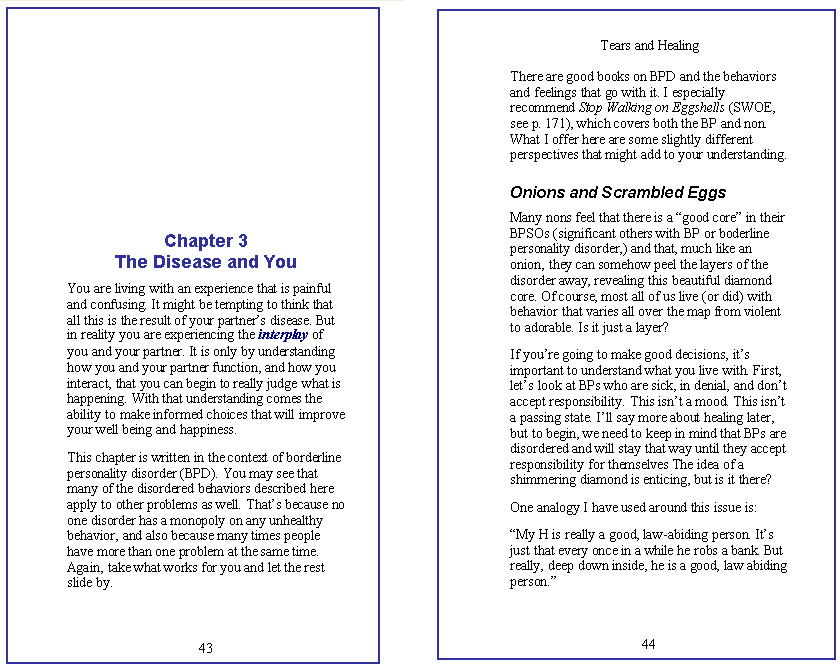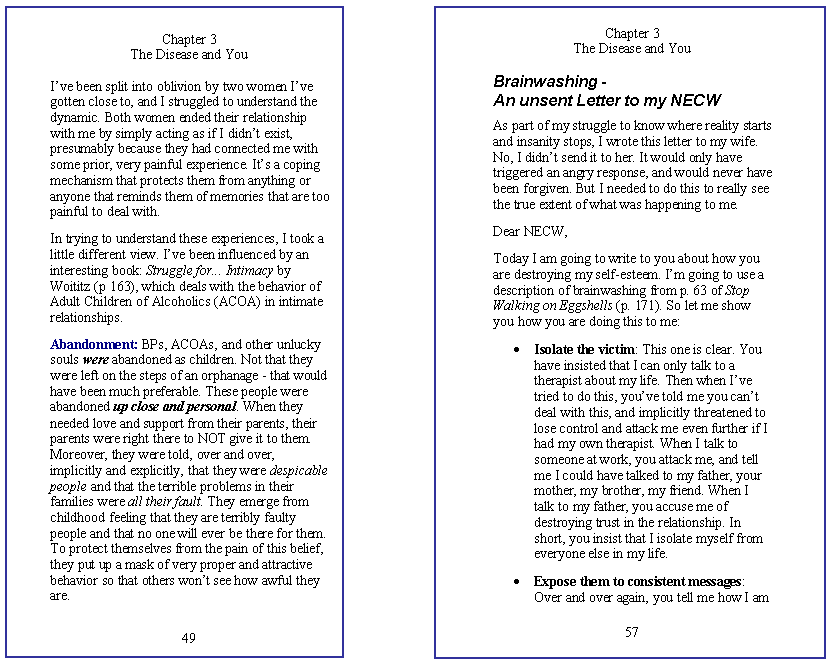|
|
Living with a Disordered Partner
(Chapter 3)
It is painful and confusing to live with a sick partner, whether the disorder
is borderline personality disorder,
narcissistic personality disorder, alcoholism, antisocial personality disorder, or whatever,
. It might be
tempting to think that all the madness in your life is the result of your
partner's disorder. But in reality you are experiencing the interplay of you and your
partner's disorder. It is only by understanding how you and your partner function,
how his or her personality disorder affects his or her behavior, and how
you interact, that you can begin to really judge what is happening.
Borderline personality disorder, narcissistic personality disorder, and
antisocial personality disorder all lead to behavior that is abusive. Alcoholics
often suffer from these disorders even if it isn't recognized. People who
suffer from these disorders have extreme emotions, which lead them to actions
that can range from puzzling to brutal. Personality disorders are aptly named,
because the minds of people who suffer from these disorders work differently
than healthy people. People suffering from borderline personality disorder
respond to some events with extreme fear of abandonment - events that would have
little meaning to a healthy person. Similarly, those suffering with
narcissistic personality disorder respond with extreme defensive actions to
events which they feel threaten their perception as special and
privileged. Those with antisocial personality disorder lack normal
feelings of responsibility and compassion and thus have little motivation to
restrain their reactions. And alcoholics can show any of these, while at the
same time their natural inhibitions from hurtful behavior are suppressed by the
intoxication.
People with all of these personality disorders - borderline personality
disorder, narcissistic personality disorder, and antisocial personality disorder
- have serious maladjustments in coping with life. Thus, they live in emotional
turmoil. They seek to present a very together appearance, hiding their disease
from most people. It is only when we get into a close and private relationship
with someone with these personality disorders that the abusive behavior comes
out. And because their lives are wracked with emotional turmoil, there is a lot
of pent-up emotion that can be focused on us.
All of this leads a lot of confusion for those of us unlucky enough to be in
committed relationships with someone with a personality disorder. My own
experience was with someone who probably would have barely diagnosed at her
worst - and definitely not at her best - with borderline personality disorder.
What I have learned, as I have begun helping people with broader experiences, is
that much of what I learned about abuse and borderline personality disorder also
applies to narcissistic personality disorder and even antisocial personality
disorder.
Another thing I've observed over time is the link to alcoholism. AA and
Al-Anon have a culture that treats alcoholism as a disease alone and apart.
Thus, people getting support through these channels tend to think that there is
nothing more to learn beyond alcoholism. At the same time, this approach leaves
some things unexplained. They talk about "dry drunks" and problems
that persist long after alcoholics get sober. Why is this so? If addictive use
of alcohol is the problem, why don't things improve when the alcohol abuse
stops?
The reality is more likely that alcoholism and other addictions, like
pot/marijuana, prescriptions drugs, cocaine, etc, are the result of a
personality disorder. In the case of my ex-wife, a mixed addictions to alcohol
and prescription psych meds was the result of self-medication to deal with the
emotional pain of her disorder. Addiction is extremely toxic, and greatly
worsens the effects of a personality disorder. But if the substance abuse stops,
the underlying personality disorder is still there.
Thus, understanding how a partner borderline personality disorder, narcissistic
personality disorder, antisocial personality disorder, alcoholism, and substance
abuse will interact with us is essential if we are to get a handle on our
situations and our own lives.
|




